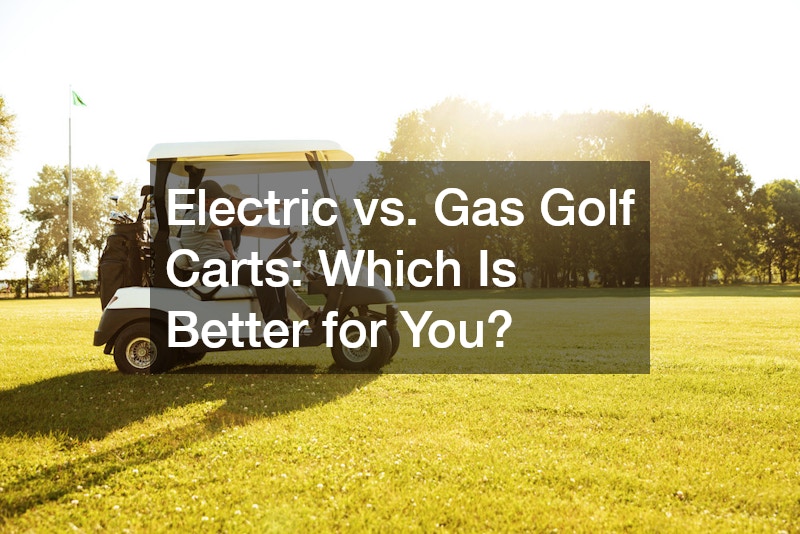When choosing between electric and gas golf carts, it’s important to consider how and where you plan to use them. Golf carts are no longer just limited to golf courses – they’re now used in residential communities, farms, events and even industrial settings across Australia.
Each type of golf cart offers unique advantages depending on your priorities. Whether you value performance, cost efficiency or environmental impact, understanding the key differences will help you make the right decision.
Power and Performance
Gas-powered golf carts tend to have more horsepower than electric ones. This makes them ideal for rugged terrain, longer distances or towing small trailers. If you live in a hilly area or plan to use your cart for heavy-duty tasks, gas might be a better option.
Electric golf carts, on the other hand, offer quiet and smooth operation. They’re perfect for areas where noise could be an issue, such as gated communities or resorts. While they might not have the same raw power as gas models, most electric carts handle flat or mildly uneven terrain with ease.
Modern electric carts have improved significantly in torque and battery technology. Lithium-ion batteries are now common, providing longer life and faster charging than older lead-acid versions.
Environmental Impact
One of the biggest advantages of electric golf carts is their environmentally friendly design. They produce zero tailpipe emissions and don’t require fossil fuels, making them a greener option for eco-conscious buyers.
Gas golf carts emit carbon monoxide and other pollutants. They also require regular refuelling and maintenance, including oil changes and filter replacements. While some newer gas models are more efficient, they still leave a larger carbon footprint than their electric counterparts.
If reducing your environmental impact is a key concern, an electric model will be the better choice.
Cost of Ownership
Initial purchase prices for electric and gas golf carts can be similar, but the long-term costs can differ. Electric carts tend to have lower operating expenses. Charging a battery is generally cheaper than buying petrol, and maintenance is simpler since there are fewer moving parts.
Gas golf carts require more ongoing maintenance. This includes spark plugs, oil changes and air filters, which can add up over time. Fuel costs also fluctuate, adding another variable to your budget.
Battery replacement is one of the main costs for electric carts, typically required every four to six years. However, with proper care and the use of modern battery types, this expense can be minimised.
Noise and Comfort
Electric golf carts are nearly silent when operating, making them ideal for quiet environments. This not only provides a more pleasant experience for the driver and passengers but also reduces noise disturbance to others nearby.
Gas carts are noisier due to the combustion engine. While some users are not bothered by this, others may find it disruptive, particularly in residential or holiday settings.
If you prioritise a peaceful ride and low sound levels, electric is the better choice.
Range and Refuelling
Gas golf carts generally have a longer range between refuels. This makes them a good choice for full-day use or areas where charging stations are not accessible. You can refuel quickly and be back on the move in minutes.
Electric carts are limited by battery capacity. Charging takes time, usually several hours unless fast-charging options are available. However, for daily use over short distances, electric models perform well and are more than sufficient.
It comes down to your usage patterns. For consistent short trips with overnight charging, electric carts work well. For long or continuous use without convenient charging access, gas may be more practical.
Use and Regulations
In some areas, electric golf carts are favoured or even mandated due to environmental or noise regulations. Local councils, holiday parks and golf courses often prefer electric models to reduce their ecological impact and maintain a quiet atmosphere.
Gas carts may be restricted in certain locations, especially where emissions and noise are a concern. It’s important to check local guidelines and community rules before making your purchase.
Electric models are also easier to register and insure in many places, particularly when they’re used on public roads or shared pathways.
Which One Should You Choose?
Choosing between gas and electric golf carts depends on your specific needs. If you require power, range and quick refuelling for off-road use or long days on the move, gas might be the right fit.
If you prefer a quieter ride, lower maintenance and a more environmentally friendly option, electric carts are a smart choice. They’re especially well-suited to residential use, golf courses and lifestyle communities.
Ultimately, both types of golf carts have their place. By considering how you plan to use your cart and what features matter most to you, you can find a model that fits your lifestyle and budget.

